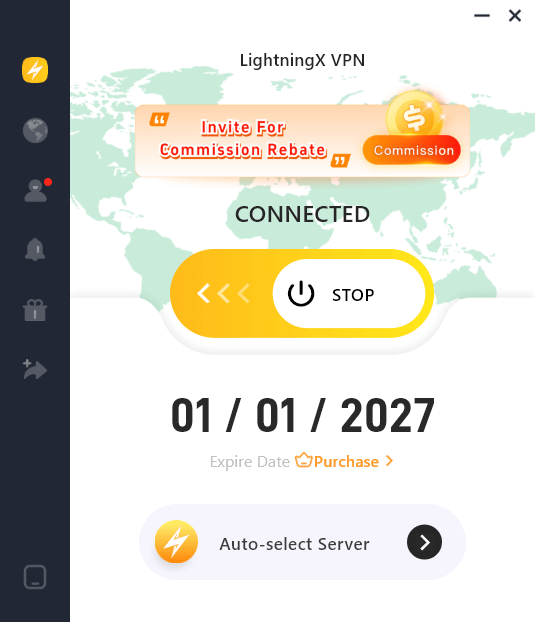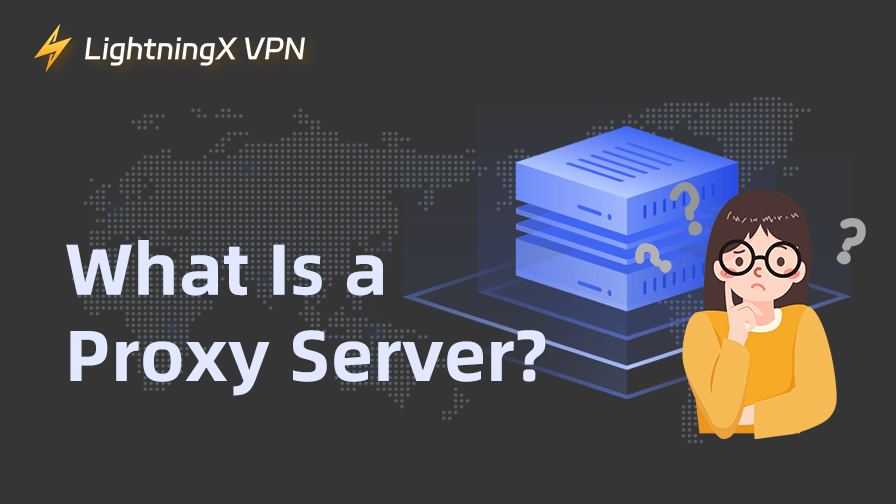What is a proxy server? You’ve probably heard the term before, especially in conversations about internet privacy or bypassing restrictions. But what does it actually mean? In this guide, we’ll explain what a proxy is, how it works, and why it’s used in everything from anonymous browsing to managing network traffic.
What Is a Proxy Server?
A proxy server acts as an intermediary between your device and the internet. When you use a proxy, your web requests are sent through the proxy first, which then forwards them to the destination server on your behalf.
As a result, the website you’re visiting sees the proxy’s IP address instead of your own. This helps enhance online privacy, bypass geographic restrictions, and sometimes improve security.
If you are still not clear yet, here’s a simpler and more concrete explanation.
What does proxy mean? Think of a proxy server as a middleman between you and the websites you visit. Instead of contacting sites directly, your traffic first goes to the proxy, which then talks to the internet for you. This hides your real IP address and can improve both privacy and access.
Types of Proxy Server
So, how many types of proxy servers are there? Let’s break them down.
1. Forward Proxy
This is probably the proxy you hear about most often. It acts as a gatekeeper between your devices and the internet, intercepting your requests and deciding whether to send them on.
You’ll mostly find forward proxies in schools, the workplace, or personal VPN setups, where they can control access and help with privacy.
2. Reverse Proxy
What is a reverse proxy? Unlike forward proxies that serve the client, reverse proxies are stationed on the server side. They screen incoming traffic for you before it ever touches the backend. For high-traffic websites, this can mean the difference between smooth performance and a crash.
3. Transparent Proxy
Transparent proxies operate quietly behind the scenes. Users usually don’t even realize they’re there. Organizations rely on transparent proxies to monitor network traffic or enforce policies without drawing attention.
4. Anonymous Proxy
Want to browse without revealing your IP address? Anonymous proxies mask your identity and keep your real IP hidden from websites. Though they disclose their proxy status, they still offer a decent layer of privacy.
5. Data Center Proxy
Originating from cloud servers or data centers rather than real homes, they can be super-fast and affordable. However, it’s also easier for sites to detect and block compared to residential IPs.
Advanced Proxies:
Residential Proxy
These proxies use IP addresses assigned to real households by ISPs. Because they mimic real users, they’re harder to detect or block. You can consider them as a strong choice for tasks like web scraping, SEO monitoring, or accessing geo-restricted content.
Elite Proxy
Also known as high-anonymity proxies, these don’t reveal that you’re using a proxy or expose your original IP. They’re ideal for users who need maximum privacy, especially when handling sensitive data or bypassing strict firewalls.
Distorting Proxy
It’s occasionally used for geo-spoofing, but its honesty about being a proxy can reduce its effectiveness in high-security scenarios.
SOCKS Proxy
SOCKS proxies operate at a lower level than HTTP proxies. They don’t interpret traffic, just forward it, so they’re more flexible.
Shared Proxy vs. Dedicated Proxy
Shared proxies are used by multiple clients at once, which makes them cost-effective but more prone to slowdowns and bans.
Now that you know the types, you might be wondering: how do I actually start using one? Check out our guide on how to set up a proxy server to get started.
How Does a Proxy Work?
When you send a request (visiting a website or loading an app) online, a proxy can step in and handle that request for you. Instead of your data going straight to the destination, the proxy intercepts it, relays it on your behalf, and then returns the response.
This makes it possible to hide your IP address, enforce custom rules, or even redirect traffic as needed. Depending on the setup, a proxy can act like a gatekeeper, a translator, or even a bodyguard, filtering what gets in and out.
In short, it rewrites the path your traffic takes.
Why Use a Proxy Server?
Sometimes it’s about privacy. You don’t want every website to know exactly where you are or what device you’re on. A proxy puts some distance between you and the internet – it’s like using a P.O. box for your browsing.
Other times, it’s about access. Geo-restricted site? Blocked app at school or work? A proxy can help you get around all that.
They can also make things faster. Some proxies store copies of websites you visit often, so next time, it loads quicker. And if you’re running a business? Proxies can balance traffic, filter content, and add a layer of basic security without making things overly complicated.
Sometimes proxies can slow down your connection or cause issues. If you want to switch back, learn how to disable the proxy.
Proxy vs. VPN
Both proxies and VPNs help hide your IP address, but they do it in different ways and for different reasons. A proxy is like a quick disguise: it reroutes your traffic for one app or website, often without encryption. Great if you’re just trying to bypass a geo-block or hide your IP on a browser.
A VPN, on the other hand, goes deeper. It creates an encrypted tunnel for all your traffic, no matter what app you’re using. That means more privacy, better protection on public Wi-Fi, and fewer chances of being tracked.
Think of it this way:
- A proxy hides part of you.
- A VPN is more like going full incognito.
So, if you need full privacy and security, VPN wins. But for casual, lightweight tasks, a proxy might be all you need.
Free Proxy Server
Free proxy servers offer a fast, no-cost way to hide your IP and access blocked content.
Tools like KProxy, Hidester, ProxySite (one of the more popular proxy sites), or CroxyProxy operate through web interfaces, no installation needed, just enter the URL and start browsing. They’re useful for light browsing or bypassing region restrictions when you don’t need full encryption.
But from a technical standpoint, they come with trade-offs. Free proxies rarely support HTTPS tunneling securely, and many lack proper encryption altogether.
Some insert ads or log your browsing activity, which poses privacy risks. Since they’re shared among thousands of users, performance is often inconsistent, and popular sites may block them altogether.

For full encryption and consistent access across networks, VPNs are the preferred solution. LightningX VPN is trustworthy. It combines high-speed and advanced privacy features, so it is a versatile and convenient tool.
When you’re on public Wi-Fi or need to access content from different regions, LightningX VPN makes it simple and secure with 2000+ servers in over 70 countries. It works smoothly on various devices, including Android/iOS/macOS/Windows/TV/Linux/Chrome, etc.
FAQs – What Is a Proxy
Is Using a Proxy Server Legal?
Yes, using a proxy is legal in most countries. However, you should keep yourself on the line. Always access the contents you are allowed to, and don’t use them for illegal activities.
Will a Proxy Make My Internet Faster?
Not really. Some proxies can help with caching and speed things up slightly. But generally, proxies aren’t meant for performance boosts. In fact, they can sometimes slow things down.
What’s the Difference between HTTP and SOCKS Proxies?
HTTP proxies are good for browsing websites, while SOCKS proxies handle all types of traffic, like games, apps, or P2P. SOCKS5 is more flexible but often slower.















